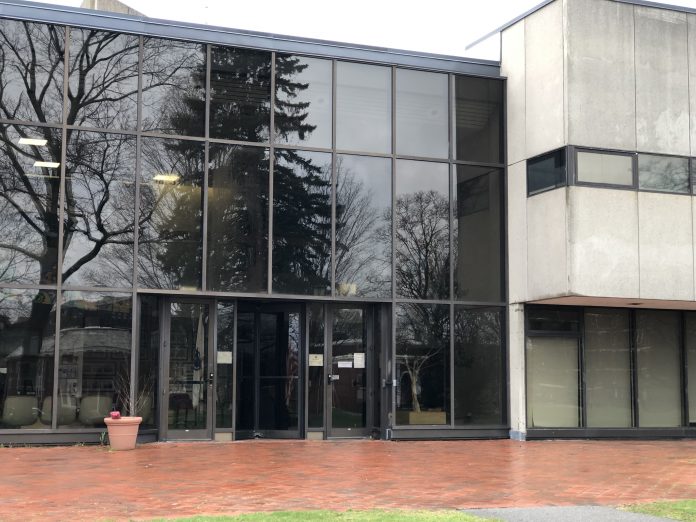By Geena Monahan—For the North Star Reporter
Stephen Berdos, human services coordinator for the Health Department, has kept treatment for substance use disorders and helping those struggling with addiction at the top of his list since accepting he arrived last October.
However, President Donald Trump’s proposed $1.1 billion in budget cuts to the Substance Abuse and Mental Health Services Administration may create an uphill battle for Bristol County residents trying to combat substance use disorders.
Mandated opioid use disorder treatment services in correctional facilities will be one of the many programs facing a loss of funding, and Berdos expressed concern over the impact thinks this may have on inmates who are trying to recover, rehabilitate and re-enter society.
“Everyone is deserving of dignity and adequate treatment,” said Berdos. “My concern is that if treatment services within the correctional facility are not provided at the optimal staffing level due to funding shortfalls, this will impact the trajectory of recovery for those individuals who re-enter their community after incarceration.”
The Bristol County Sheriff’s Office operates two campuses of correctional facilities: a main campus in Dartmouth that’s home to the Bristol County House of Corrections and Women’s Center, and the Ash Street Jail in New Bedford. Serving North Attleborough and 19 additional cities and towns, the facilities typically hold around 650-700 inmates.
Bristol County Sheriff Paul Heroux voiced similar concerns, specifically around the cuts to personnel that will drastically affect the number of hours of treatment and services inmates will receive as part of their rehabilitation process.
“It results in fewer hours of programs per week, meaning inmates are much less prepared for the real world,” said Heroux. “These cuts result in a lack of preparation; an inmate who is not as properly prepared means that they could be more likely to reoffend. That could have them getting more involved in buying drugs, where there’s no victim other than themselves, but then they could steal to pay for drugs, or break into homes, or start selling the drugs.”
According to a statement from the sheriff’s office, one such program that will not be reinstated is a $63,100 Women’s Substance Abuse grant that supported 40 hours of substance abuse treatment per week. A Residential Substance Abuse Treatment grant, which supports 65 hours per week of substance abuse treatment for the male population, is another program that faces uncertainty when it ends in October, the month after these budget cuts are set to go into effect.
The True Course program, funded by the Office of Juvenile Justice and Delinquency Prevention under the Children of Incarcerated Parents, is another program that Sheriff’s Office Chief of Inmate Services Jodi Hockert-Lotz spoke of.
According to Hockert-Lotz, “the unavailability of True Course funding will affect three full-time staff and we will no longer be able to provide case management services and activities to the children and parents of incarcerated individuals in the community. This program also provides parenting education utilizing the ‘Parenting Inside Out’ curriculum to better prepare them for reunification.”
The sheriff’s office will continue to provide the True Course program through its operating budget, but will have to cut the number of hours of programming from seven classes per day down to approximately three per day across seven various housing units.
“We do have 80 hours of additional behavioral and substance abuse programming that we fund through our general operating budget and we are working to redistribute some of these program hours to continue to support our substance abuse treatment units,” said Hockert-Lotz. “We are going to have 100 hours of programming spread out amongst four locations and a population of around 600 inmates. These changes will result in a decrease of about 85 hours per week.”
A plan for the future
Despite the impact losing billions of dollars in federal funding could have on the judicial system and those in treatment for addiction, Berdos’ outlook on helping North Attleborough residents remains positive.
Berdos has focused his efforts on working with the town’s Opioid Task Force on how to best use the $2.4 million North Attleborough will receive over the next 14 years as part of a statewide settlement to Massachusetts’ municipalities impacted by the opioid crisis. This includes the new mental health clinician position created with those funds.
The job will consist of proactive work in the community, along with working in schools, riding along with police officers to respond to calls involving opioid use or mental health crises, and following up with after-care after a person is discharged from the hospital following an overdose.
“I’m hopeful that that position will mitigate some damage from budget cuts and be able to connect people who are vulnerable to treatment in the community,” said Berdos. “They’ll be able to respond to people who are having a mental or substance abuse-related crisis.”
In conjunction with the Northern Bristol County Public Health Alliance, the Health Department rolled out a free Narcan program in June to provide residents with the life-saving drug, which is also funded by opioid settlement dollars.
According to Anne Marie Fleming, North Attleborough’s public health nurse, the program has been slow to gain traction in the community, with just two residents requesting the free Narcan so far.
“Stephen Berdos is in the process of approving and scheduling Narcan trainings this fall,” said Fleming. That may increase the requests as people become more comfortable with how to use the Narcan….There will be numerous trainings open to the public at the library.”
Berdos also hopes to collaborate with the Bristol County Sheriff’s Department to allocate opioid abatement funding so that treatment programs in the correctional facilities can continue to be fully funded and fully staffed.
“I feel that collaborating with the Bristol County Sheriff’s Department and other communities within the county on regional initiatives is critically important to ensure successful treatment outcomes for some of the most vulnerable residents in our communities,” said Berdos.

